
Callistege mi, the Mother Shipton moth, is a moth of the family Erebidae. It was classified by Carl Alexander Clerck in 1759, and is also known under the name of Euclidia mi. In Finnish it is known as piirtoyökkönen and in German as Scheck-Tageule.

Chromis is a genus of fish in the family Pomacentridae. While the term damselfish describes a group of marine fish including more than one genus, most damselfish are in the genus Chromis. These fish are popular aquarium pets due to their small size, tolerance for poor water quality, and bright colors, though their lifespans tend to be shorter than other fish.

Monarda is a monotypic moth genus in the family Sphingidae. Its only species, Monarda oryx, is known from Mexico. Both the genus and species were described by Herbert Druce in 1896.

Dactyloceras lucina is a species of very large moth of the family Brahmaeidae. It is found in central and west Africa, where it has been recorded from Equatorial Guinea, Ghana, Ivory Coast, Kenya, Sierra Leone, Uganda and Zambia. The species was first described by Dru Drury in 1782.
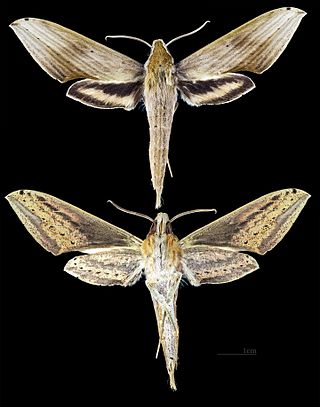
Xylophanes libya, the Libya sphinx, is a moth of the family Sphingidae. The species was first described by Herbert Druce in 1878. It is known from southern Texas, Mexico, Belize, Guatemala, Panama and from Venezuela south and west to Bolivia and Paraguay.
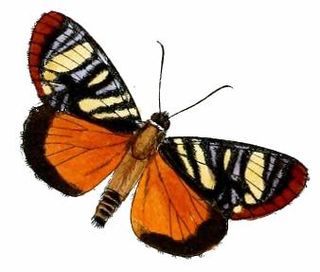
Polacanthopoda tigrina is a moth in the family Noctuidae first described by Herbert Druce in 1882. It is found in Cameroon, the Republic of Congo, the Democratic Republic of Congo, Gabon, Ghana, Guinea, Nigeria and Uganda.

Callhistia grandis is a moth in the family Geometridae first described by Herbert Druce in 1882. It is found on New Guinea.
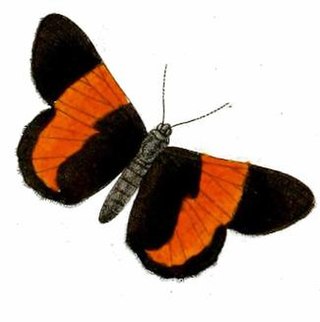
Chiasmia goldiei is a moth in the family Geometridae first described by Druce in 1882. It is found in Australia and Papua New Guinea.
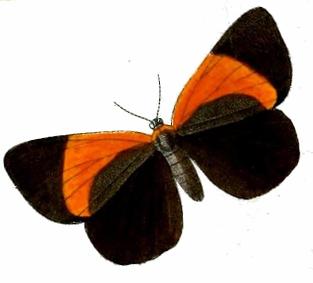
Chiasmia separata is a moth in the family Geometridae first described by Herbert Druce in 1882. It is found on Saint Helena and has also been recorded from South Africa, Angola, Cameroon, Ivory Coast, Kenya, Madagascar, Mozambique, Nigeria, Rwanda, Tanzania and Uganda.
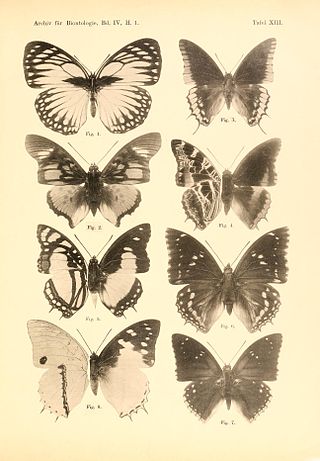
Charaxes acraeoides is a butterfly in the family Nymphalidae first described by Herbert Druce in 1908. It is found in Cameroon, Gabon, the Republic of the Congo, the Central African Republic and the Democratic Republic of the Congo.
Podomachla acraeina is a moth of the family Erebidae first described by Herbert Druce in 1882. It is found in Cameroon, Equatorial Guinea, Ghana, Nigeria, Sierra Leone and Togo.
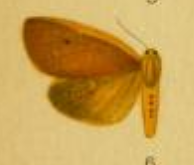
Spilosoma gynephaea is a moth in the family Erebidae. It was described by George Hampson in 1901. It is found in South Africa and Zimbabwe.
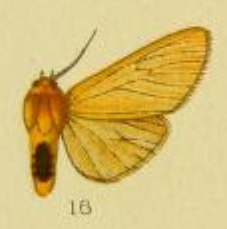
Spilosoma pales is a moth in the family Erebidae. It was described by Herbert Druce in 1910. It is found in Kenya, Tanzania and Uganda.
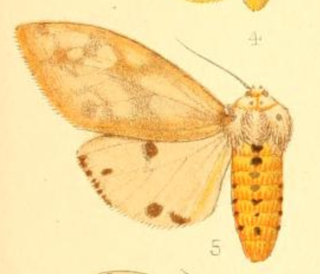
Spilosoma rava is a moth in the family Erebidae. It was described by Herbert Druce in 1898. It is found in Cameroon, the Democratic Republic of the Congo, Equatorial Guinea, Gabon, Ghana, Kenya, Liberia, Nigeria, Senegal, the Gambia and Uganda.

Crameria is a monotypic moth genus in the family Noctuidae erected by Jacob Hübner in 1819. Its only species, Crameria amabilis, was first described by Dru Drury in 1773.

Otroeda cafra is a species of moth in the tussock-moth subfamily Lymantriinae. It was first described by Dru Drury in 1782 from Sierra Leone, and is also found in Cameroon, DR Congo, Malawi, and Nigeria.

Otroeda nerina is a species of moth in the tussock-moth subfamily Lymantriinae. It was first described by Dru Drury in 1782 from Sierra Leone, and is also found in Cameroon, DR Congo, Gabon, Ghana and Nigeria.
Pedoptila thaletes is a moth in the family Himantopteridae. It was described by Herbert Druce in 1907. It is found in the Republic of the Congo and Cameroon.

Catopyrops ancyra, or Felder's lineblue, is a species of butterfly belonging to the lycaenid family described by Cajetan Felder in 1860. It is found in the Indomalayan and Australasian realms.

Chromis hangganan, the dark margin chromis, is a species of marine fish of the damselfishes in the family Pomacentridae belonging to the genus Chromis. This species was first described in 2019, along with Chromis bowesi and Chromis gunting, discovered and known only from Lubang Island, in the Philippines. It is characterized by 10–12 dorsal fin rays, 11–12 anal fin rays, 18 pectoral fin rays, 3 caudal fin rays that are procurrent, 16 lateral line scales that are tubed, 23–26 gill rakers, and a body depth of 1.9–2.0 in standard length(5.78 cm in length) as differed from other congeners. The adult fish's color when fresh is yellowish having dark black margins on the dorsal and anal fins.

















